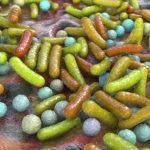By David Blyweiss, M.D., Advanced Natural Wellness
April 3, 2020
There’s a new kid on the block…
It’s a fizzy, tangy, and sometimes sweet drink. The health benefits are impressive and the taste is – in my opinion – delicious.
I’m talking about kombucha!
Every night, when I sit down for my meal, I open a bottle (Gingerade is my favorite) and enjoy quenching my thirst with each sip. It has a wide variety of health benefits. It promotes heart health, protects against cancers, and helps maintain blood sugar levels.
But more importantly, it is filled with gut-friendly pre and probiotics that keep my gut microbiome ticking along at full speed as well as digestive enzymes to support my own digestion.(It’s also a friendlier option for some people other than the gut-healthy foods like sauerkraut and kimchi.)
Now, many folks go to the trouble of making their own homemade kombucha…
It involves a somewhat lengthy process where plain black or green tea is brewed and combined with sugar. Then, a starter population of bacteria and yeast is added – known as a SCOBY.
The SCOBY- which stands for Symbiotic Cultures of Bacteria and Yeast – is the key ingredient that transforms plain tea into a fizzy fermented drink over the course of 1-3 weeks.[1]
During this process, a mushroom-like cloud may form on the service of the beverage. This helps explain kombucha’s other name… “mushroom tea.”
Open your arteries, improve blood flow for a new health miracle...
Did you know your circulatory system has over 60,000 miles of arteries, veins and other blood vessels, if stretched end to end?
But as you age, your blood vessels undergo changes, which may cause them to stiffen, thicken and get clogged.
GOOD NEWS! Doctors have now identified a “Miracle Molecule” inside your arteries that helps OPEN your arteries and IMPROVE blood flow.
It’s what Dr. Valentin Fuster calls it, "One of the most important discoveries in the history of cardiovascular medicine."To you, that means...
- Healthy blood pressure
- Sharper mind and memory
- Skyrocketing energy and muscular strength
- Increased pleasure and passion in the bedroom
- Improved circulation to every cell and organ in your body
Go here to discover a new natural way to significantly boost the levels of this miracle molecule in YOUR body NOW!
Personally, I think the SCOBY looks a bit like a slimy blob and something you’d find in a sci-fi movie.
Plus, I’m not interested in going to the trouble of brewing my own drink. So, I usually opt to spend a few bucks and purchase my kombucha pre-made from the store.
Regardless of how you stock your kitchen with kombucha, you will benefit from a delightful drink filled with antioxidants, B-vitamins and probiotics.
The Many Health Benefits of Drinking Kombucha
Kombucha originated thousands of years ago in northeast China, Manchuria if you believe the legend.
During the fermentation process, acetic acid (vinegar) is produced along with other acidic compounds. It also includes a very small amount of alcohol and gases that provide the characteristic fizz.[2]
Studies have shown that kombucha brewed from black or green tea actually has antifungal and anti-microbial properties – making it a very healthful drink. It works especially well against Candida yeast.[3]
Besides protecting against infection, kombucha will also bless you with a dose of antioxidants. Just like my beloved blueberries, the antioxidants in kombucha will help rid your body of free radicals and reduce inflammation.
Studies have shown that kombucha can be beneficial against liver disease where oxidative stress is known to play a crucial role.[4]
It also helps with heart health and will improve two important markers of heart disease – LDL and HDL cholesterol levels.[5]
It will help you manage your type 2 diabetes. A study done on diabetic rats found that kombucha can slow the digestion of carbohydrates to reduce blood sugar levels while improving liver and kidney function.[6]
If that’s not enough to impress you, kombucha can also help protect you from cancer!
Test tube studies showed kombucha prevented the growth and spread of cancerous cells thanks to its high levels of antioxidants and tea polyphenols.[7]
Are You Suffering From...
- Love handles and a pot belly
- Romance that isn't what it used to
- Forgetfulness and inattention
- Low (or no) strength and endurance
- A sex drive that's shifted into neutral...or worse
If so...you may have Mature Male Burnout. Click here to discover more about this unique condition and what you can do about it.
Green Tea Gives Kombucha an Extra Boost of Power
Now, by this point you might want to run to the store to buy your own supply of kombucha – but there are a few things more to know.
First of all, there are many different brands to choose from. Personally, as I mentioned before I like the Gingerade flavor from the brand GTS.
You may find that some brands are sweeter than others and appeal more to your personal tastes.
You’ll also have a choice of buying kombucha made from black or green tea…
While black tea kombucha is fine, you will have some additional health benefits if you choose to go with the green tea varieties.
Green tea on its own contains compounds called polyphenols, bioactive non-nutrient plant compounds.These are powerful antioxidants for your body.
Studies show that drinking green tea regularly can help you increase the number of calories you burn, reduce your belly fat levels, control cholesterol, and even help with blood sugar levels.[8],[9],[10],[11]
Green tea has also been known to help reduce the risk of cancers including prostate, breast, and colon cancers. [12],[13],[14]
Whether you make it on your own, or buy it from the store, kombucha is a great choice to support a healthy gut.
Just beware, your gut bacteria may respond to this drink with increased levels of gas while they happily digest the beverage. Try to think of this as your gut bacteria “thanking you” for the healthful drink!
Sources:
[1] Young, Allison. Good Housekeeping. “How to Make Your Own Homemade Kombucha.” 2018 July 19. Accessed Online: https://www.goodhousekeeping.com/food-recipes/healthy/a20706158/how-to-make-kombucha/
[2] Mayser, P et al. “The yeast spectrum of the ‘tea fungus kombucha’.” Mycoses. July-Aug;38(7-8):289-95. 1995. https://www.ncbi.nlm.nih.gov/pubmed/8559192
[3] Battikh, Houda, et al. “Antibacterial and antifungal activities of black and green kombucha teas.” Journal of Food Biochemistry, Vol 37, Issue 2. 2012. https://onlinelibrary.wiley.com/doi/abs/10.1111/j.1745-4514.2011.00629.x
[4] Bhattacharya, S., Gachui, R., Sil, PC. “Hepatoprotective properties of kombucha tea against TBHP-induced oxidative stress via suppression of mitochondria dependent apoptosis. Pathophysiology. 2011 June: 18(3):221-34. https://www.ncbi.nlm.nih.gov/pubmed/21388793
[5] Bellassoued, K. et al. “Protective effect of kombucha on rats fed a hypercholesterolemic diet is mediated by its antioxidant activity.” Pharm Biol. 2015;53(11):1699-709. https://www.ncbi.nlm.nih.gov/pubmed/25856715
[6] Aloulou, A. et al. “Hypoglycemic and antilipidemic properties of kombucha tea in alloxan-induced diabetic rats.” BMC Complement Altern Med. 2012 May 16;12:63. https://www.ncbi.nlm.nih.gov/pubmed/22591682
[7] Thummala, Srihari et al. “Downregulation of signalling molecules involved in angiogenesis of prostate cancer cell line (PC-3) by kombucha (lyophilized)” Biomedicine & Preventive Nutrition
Volume 3, Issue 1, January–March 2013, Pages 53-58. http://www.sciencedirect.com/science/article/pii/S221052391200044X
[8] Dulloo, AG, et al. “Efficacy of a green tea extract rich in catechin polyphenols and caffeine in increasing 24-h energy expenditure and fat oxidation in humans.” Am J Clin Nutr. 1999 Dec;70(6):1040-5. https://www.ncbi.nlm.nih.gov/pubmed/10584049
[9] Nagao, T, et al. “A green tea extract high in catechins reduces body fat and cardiovascular risks in humans.” Obesity (Silver Spring). 2007 Jun;15(6):1473-83. https://www.ncbi.nlm.nih.gov/pubmed/17557985
[10] Fujita, H, Yamagami, T. “Antihypercholesterolemic effect of Chinese black tea extract in human subjects with borderline hypercholesterolemia.” Nutr Res. 2008 Jul;28(7):450-6. https://www.ncbi.nlm.nih.gov/pubmed/19083445
[11] Liu, K., et al. “Effect of green tea on glucose control and insulin sensitivity: a meta-analysis of 17 randomized controlled trials.” Am J Clin Nutr. 2013 Aug;98(2):340-8. https://www.ncbi.nlm.nih.gov/pubmed/23803878
[12] Kurahashi, N. et al. “Green tea consumption and prostate cancer risk in Japanese men: a prospective study.” Am J Epidemiol. 2008 Jan 1;167(1):71-7. Epub 2007 Sep 29. https://www.ncbi.nlm.nih.gov/pubmed/17906295
[13] Sun, CL, “Green tea, black tea and breast cancer risk: a meta-analysis of epidemiological studies.” Carcinogenesis. 2006 Jul;27(7):1310-5. Epub 2005 Nov 25. https://www.ncbi.nlm.nih.gov/pubmed/16311246
[14] Yang, G, et al. “Prospective cohort study of green tea consumption and colorectal cancer risk in women.” Cancer Epidemiol Biomarkers Prev. 2007 Jun;16(6):1219-23. https://www.ncbi.nlm.nih.gov/pubmed/17548688







